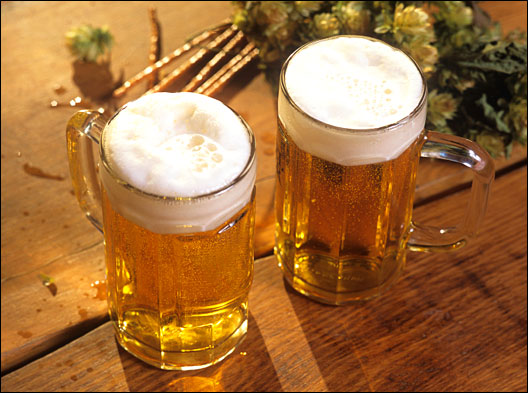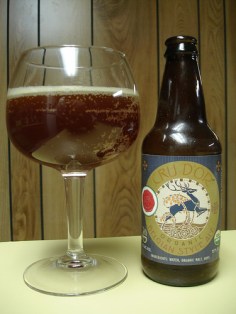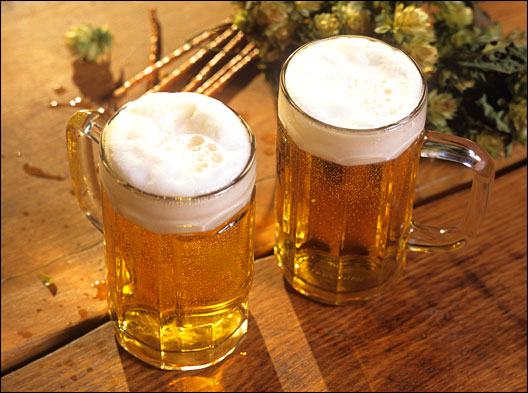
Hops and dreams.
Imagine Norman Bates, twisted hero of Hitchcock’s Psycho, stumbling into a funhouse of mirrors and finding Mother at the center, her image reflected on a thousand surfaces surrounding him. He might freak out, right?
That’s a bit how I feel when I walk into Carrboro Beverage Co., a small and extremely well-stocked beer store in Carrboro, N.C. The walls and cooler displays form a veritable crazy-quilt of craft beers from around the world — but mostly from the United States, which has become the global leader in artisanal brewing.
I usually have to make myself steer clear of the place — too many temptations for someone short on time and cash. But when my merciless editor demanded to know when precisely I planned to turn in my third organic-beer-tasting article, I knew whom to call to set up a hasty tasting.

Grist's pick: North Coast Brewing Company’s Cru D’Or Belgian Style Ale. (Photo by @joefoodie.)
For the first two Bottom Line beer tastings, I scoured natural-food supermarkets and co-ops for organic beers. I found it hard to scare up many specimens. For my first article, I found seven organic brews. For the second — written at a time of sky-high hops and barley prices — I turned up only five, two of which were repeats from the previous go-round. Moreover, while the U.S. craft-beer industry was moving in experimental, so-called “extreme” directions — “imperial” this, “double” that — the organic beers I was getting my hands on tended to be pretty staid.
Jason Cole, manager of Carrboro Beverage and a walking beer encyclopedia, solved all that for me. Unlike a supermarket buyer, Jason doesn’t have to ration precious shelf space to please mass tastes. His market is beer nerds, so he can go out of his way to way to find and stock interesting stuff. Jason procured no fewer than 11 organic craft brews for me — only three of which we’d tasted before here at the Bottom Line beer department. To round out the dozen, I scored a truly unique Belgian spelt beer from my friends over at Chapel Hill’s 3 Cups, a frequent host for Bottom Line tastings.
Jason presided over a panel that included me; Chapel Hill metalworker Leo Gaev; Matt Souza of 3 Cups; Bernard Luscans, a professor of French at the University of North Carolina at Chapel Hill; and Julia Thompson, who works with Jason at Carrboro Beverage. As always, the tasting was conducted blind. I asked everyone to describe appearance, aroma, flavor, and finish, and then to rank their three or four favorites in order of preference. Here’s what we found.
Lammsbrau Pilsner
Neumarkter Lammsbrau, Neumarkt, Germany
Price: $1.90/12 oz.
Eco-claim: The world’s largest certified organic craft brewery
This “medium gold, slightly opaque” beer pleased but didn’t wow the panel. I found it well made, with mild yeasty notes and a lightly, creamy mouthfeel. Matt picked up wheat, citrus, and floral notes on the nose, and hints of lemon on the palate. Leo found iron, and Bernard got apple flavors.
Joseph Spelt Ale
Brewery Silenrieux, Silenrieux, Belgium
Price: $8.39/1 pt, 9.4 oz.
Eco-claim: Certified organic by EcoCert
This one fared well, tying for third place. It showed cloudy and honey-gold in the glass. On the nose, Matt found hints of apple, fermented cider, and earth; Bernard picked up malt and rubber. I found it round and lightly sweet on the palate, balanced with a deft dash of hops on the finish. I also appreciated what I found to be a surprisingly creamy and substantial mouthfeel for a light-colored beer. Matt, its biggest fan, praised “its excellent nutty finish.” Julia was a holdout — she found its aroma “skunky.”
Samuel Smith Organic Lager
Samuel Smith Brewery, Yorkshire, England
Price: $2.79/12 oz.
Eco-claim: Certified organic by the USDA-accredited UK Soil Association
This one, from the revered UK brewery Sammy Smith, had a solid showing, faring much better than it did in our tasting last spring. It didn’t finish in our top three, but came close. This is a beautiful beer to look at — a deep yellow gold or amber. I found it to be a classic sipping lager — a well-knit brew with wheaty malt notes balanced by a long hop finish. I also loved its silky mouthfeel. Leo picked up orange on the nose and straw and wheat on the palate, while Bernard found apricot flavors.
Black Mountain Bitter
Highland Brewing Company, Asheville, N.C.
Price: $1.90/12 oz.
Eco-claim: Certified organic through Clemson University
Another strong contender that didn’t quite make the top three among stiff competition. Leo found “musty leaves” and “crisp fruit” on the nose, giving way to acorns on the palate. Matt found it well-made — a “rich-roasted flavor” with a “well-balanced bitterness.” I liked its beer-hall yeasty scent; Bernard praised its almondy palate.
Wildfire Extra Pale Ale
Uinta Brewing Co., Salt Lake City, Utah
Price: $1.90/12 oz.
Eco-claim: Wildfire is USDA-certified; brewery is 100 percent wind-powered
This “bright-gold” beer, which placed second, sent the panel on rhetorical flights to describe its qualities — a kind of Rorschach blot in a glass. Bernard, who ranked it number-one, found a violet on the nose and straw on the palate. Julia praised its citrusy grapefruit notes. Matt rhapsodized “apricot, flower, raw walnut” nose, which gave way to “pear, fermented cider, and malt” on the palate, with a “very light bitter finish.” I found it so fruity that I wondered if it might be (very subtly) flavored with fruit (it’s not). I found strawberry on the nose, and raspberry on the palate, balanced by a lovely burst of hops. Leo found grass and seaweed on the nose (in a good way; he ranked it second) and apricots on the palate. Overall, a unique and appealing beer.
St Peter’s English Ale
St. Peter’s Brewery, Suffolk, England
Price: $4.99/pint
Eco-claim: Uses ingredients certified by the Soil Association
This beer, which we also tasted last spring, pleased everyone but couldn’t crack the top three. At this point, the tasting began to pivot in a darker direction — Leo described this offering as almond-colored; I called it rich amber. Matt found it had a slightly oxidated, sake-like aroma, turning “very rich” on the palate, with some butter flavors. I found it very dry, but with a paradoxically honey flavor — a kind of earthy, wildflower thing. Julia, too, found honey, but judged it “not super-complex.” Bernard found an apple scent, with mineral flavors.
Lakefront ESB
Lakefront Brewery, Milwaukee, Wisc.
Price: $1.90/12 oz.
Eco-claim: The country’s oldest certified organic brewery (first organic beer: 1996)
This dark, milk-chocolate-colored beer showed solidly. I found it to be the first “big” beer in the lineup — dried stone-fruit, prunelike flavors and a light-cream mouthfeel. Matt was probably its biggest champion, picking up aromas of brown sugar and maple, with a “bright orange,” “rich and fruity” flavor. Leo thought it might be slightly off, with an uncomfortable aroma of “plastic.”
Lammsbrau Dunkel
Neumarkter Lammsbrau, Neumarkt, Germany
Price: $1.90/12 oz.
Eco-claim: The world’s largest certified organic craft brewery
This, the dark version of the Lammsbrau Pilsner above, got plenty of love but didn’t quite place. Julia liked it best, declaring it “damn tasty.” Bernard picked up soy sauce on the nose and caramel notes on the palate. Matt judged it “subtle but complex,” with brown-sugar scents and lemon, honey, and brown sugar on the palate. I found it full-bodied, with a caramel nose and rich citrus notes on the palate; Leo likened the aroma to oatmeal.
Eel River IPA
Eel River Brewing, Scotia, Calif.
Price: $1.90/12 oz.
Eco-claim: America’s first certified organic brewery (first organic beer: 1999)
Again, in this lineup, a beer can draw plenty of praise and still not ascend to the top three. Matt ranked this light-brown beer among his favorites, calling it “very expressive.” He found clover honey and roasty malts on the nose, with apricot, hazelnut, and soy sauce on the tongue. Leo joined Matt in picking up soy sauce notes; he also found kumquat. Julia correctly identified it as an IPA, but found it “a little soapy.” I picked up fruity, funky (in a good way) flavors on the nose, with some chocolate on the palate and a fine hoppy finish.
Cru D’Or Belgian Style Ale
North Coast Brewing Co., Fort Bragg, Calif.
Price: $2.79/12 oz.
Eco-claim: Certified organic by Oregon Tilth
This has earned a spot in the Bottom Line Hall of Fame; it’s the only beer that’s been featured in all three of our tastings. It took top honors in our first tasting — and landed first in this one too. (Oddly, it didn’t do nearly as well in our second tasting.) Even its color inspired poetry; Leo was moved to call it “dark and stormy.” He praised its “cave-like, sweet aroma,” and found fruit tones giving way to chocolate on the palate. I loved its deep, citrusy, maraschino-cherry nose and citrus-butterscotch flavor. Bernard picked up Scotch-like aromas and bitter-almond flavors. Matt had an odd reading — he found it very rich, with a roasted nut flavor, but also found vegetal (beans, field peas) tones. Julia correctly identified it as Belgian-style, and ranked it number two.
Eel River Raven’s Eye Imperial Stout
Eel River Brewing, Scotia, Calif.
Price: $7.99/1 pint 6 oz.
Eco-claim: America’s first certified organic brewery (first organic beer: 1999)
This jet-black beer tied for third place. I ranked it tops, finding it a big beer suitable for sipping after a nice dinner. It offered a deep, Port-wine like grapiness on the nose and a rich, round, estery-chocolatey flavor. It made Leo think of the sea; he found a mossy quality. Matt found it “buttery and rich,” with a good, full body and a complex, nutty finish.” Bernard got a sweet, dried-apricot nose and caramel on the palate.
Eel River Triple Exultation Old Ale
Eel River Brewing, Scotia, Calif.
Price: $7.99/1 pint 6 oz.
Eco-claim: America’s first certified organic brewery (first organic beer: 1999)
This one showed light-reddish brown. Matt was its biggest admirer, finding molasses aromas and “zesty orange,” vanilla, and “very nutty almond” flavors. I liked it, too, picking up a similar profile to Matt, with back-pepper notes thrown in. Leo was not impressed: “subtle dirt” aroma and “neither here nor there” flavor.
The Bottom Line I found this tasting extremely encouraging: a kind of coming-of-age party for organic beer. Organic-minded beer lovers can now find classic European beers like the ones from Lammsbrau and Samuel Smith, as well as unique and experimental ones like the Joseph Spelt and the Eel River extreme beers. It’s heartening to see Cru D’Or take the top prize again, living up to its name.



